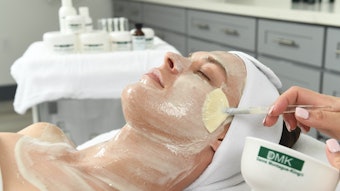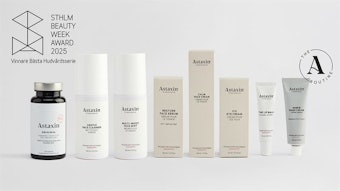
What comes to mind when you think of the term “digestion?” For most of us, it’s the breaking down of food, but this action is not relegated solely to the stomach. In fact, our skin is continually digesting, which of course, is part of the cell regeneration process that keeps us looking youthful. As we age this process slows, and here is where peptides come into play!
What Are Peptides?
Peptides are “biomimetic” because they are inspired by nature and recognized by the body, yet designed in a lab and originate from the Greek term “peptos,” which means “to digest.” Peptides are a chain of individual amino acids linked together like pearls on a necklace and have the same chemical structure as proteins.
There are many strands of peptides, each classified by the number of amino acids within its sequence. Each sequence will have unique potential based on which amino acids and the length of the chain. Palmitoyl pentapeptides, for example, are peptides that have a chain of five amino acids, and hexapeptides form a chain of six amino acids. Marine oligo peptides are a chain of a “few” natural-water amino acids.
All fixed-sequence peptides commercially available are patented. Manufacturers combine synthetic peptides with a fatty acid, which is essential to get the product into the deeper layers of skin.
Peptides Purpose
In a nutshell, peptides have the ability to relax wrinkles, tightening the skin and reduce wrinkles by promoting fibroblast synthesis, cell regeneration and neurotransmitting signalling.
Initially, the research on peptides was done in relation to wound healing. Published studies showed peptides to be instrumental in causing cells in the skin to produce more collagen as part of the body’s natural response to help skin heal.
Collagen represents the main component of the Extra Cellular Matrix (ECM) of the dermal connective tissues. Thrombospondin I (TSP) is a multifunctional protein that activates the latent, but biologically inactive form of TGF (Tissue Growth Factor). TGF is the key element in synthesis of collagen and binds to a sequence in the TSP molecule. This sequence is known as Arg-Phe-Lys and is similar to Palmitoyl Tripetide-5, therefore, it has the capacity to bind with and activate TGF.
In the beginning, Sederma was the first to develop matrikines, extracellular matrix-derived peptides, which are exact replicas of natural skin matrikines. Matrikines are specific molecules having biological activity and acting like messengers delivering a code to regenerate the skin. Since the original matrikine peptides were developed, which focused on collagen and elastin stimulation, others have come to the market that provide a range of functions, from melanocyte inhibition (brightening), to DNA oxidation protection.
Studies have also proven that some peptides act as a natural regulatory mechanism in which the peptide acts as a signal; if the skin is damaged for any reason, structural proteins are destroyed and peptides (chains of amino acids resulting from the breakdown of the larger protein) are released. The skin interprets these peptides as a signal to make some more proteins. Peptides that send the signal that more proteins (collagen) are needed are in a category of peptides considered to be “wrinkle minimizers.”
Hexapeptides, on the other hand, actually block neurotransmitters that cause muscles to contract and form wrinkles. These peptides are referred to as a “wrinkle relaxers.”
Related: Collagen and Soy Peptides Stimulate Collagen
Skin Benefits
Peptides are active at very small doses and are highly specific, having a very good safety profile when used physiologically, to assist or change an organism’s physical processes. By stimulating fibroblast, the building-block of collagen, and signaling the skin to produce more protein, peptides increase firmness, tone and diminish fine lines overall, promoting a healthier skin.
Peptides also work to hydrate the skin. Studies have shown that water plays a role in maintaining the conformation of the collagen molecule. When dry proteins get exposed to air containing any water content or humidity, they quickly draw in that water and bind water to the cell. In turn, keeping collagen hydrated helps stave off wrinkles allowing for supple and more youthful-looking skin.
Understanding that each peptide chain is unique we must also keep in mind that formulating with peptides is unique as well and will make all the difference on overall performance. It is never enough just to see an ingredient in a formula.
3 Primary Peptide Functions
- Structural (Cellular) / Messenger Peptides. These stimulate the fibroblasts that drive collagen production. They also help protect collagen against the enzymes that want to destroy or degrade it. By stimulating structural proteins the renewed and energized cell results in minimized wrinkles, firmer skin that represents more heightened tensor power.
- Neurotransmitters (Neuropeptides). This peptide inhibits the ability for neurons to transmit or receive information, thus limiting or reducing muscle contraction that improves the appearance of wrinkles. This is the “botox” affect and sometimes referred to as the “freezing peptides.”
- Rejuvenating Peptides. These peptides exhibit both of the above. It can also functions as an antioxidant, stimulate nature defensive molecules (glutathione or ergothionene as examples), provide anti-inflammatory to brightening properties and improves in function of circadian rhythms like Chronocyclin.
The Peptide Advantage
Remember hydration and peptides (collagen) are two of the best anti-aging ingredients for skin. Providing treatments and retail options with well formulated peptides can make a big difference when it comes to skin care results for your clients.
Shannon Esau the CEO and national educator at Rhonda Allison Cosmeceuticals. She brings more than 20 years experience in the esthetic industry. Esau owned skin care salons in the Dallas/Ft. Worth area, has studied chemistry in skin care formulations and has been mentored by Rhonda Allison for decades. www.RhondaAllison.com and www.REDmethod.com. For more information about Pigmentation Solutions, go to rapigmentationsolutions.com.











